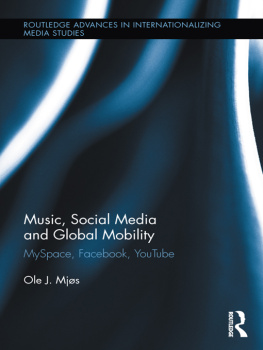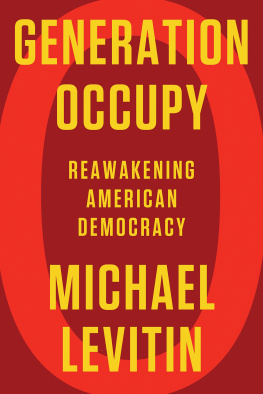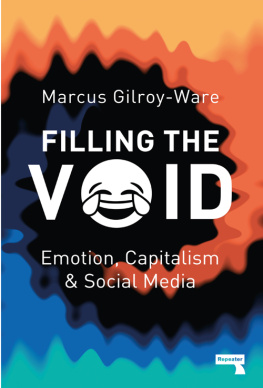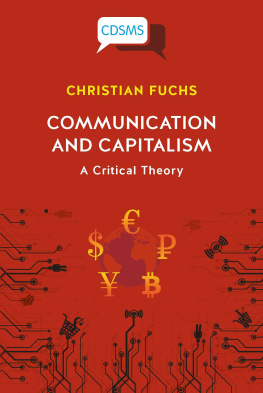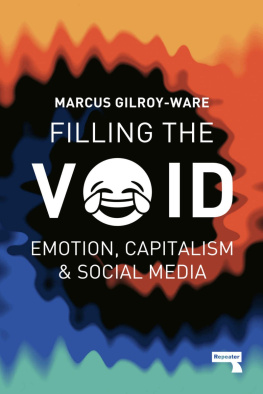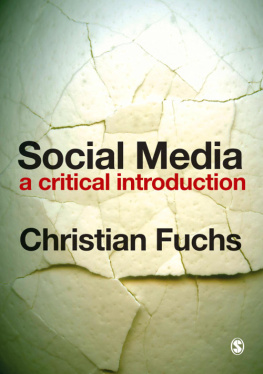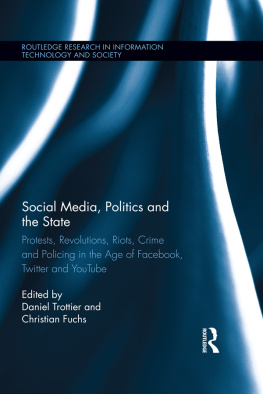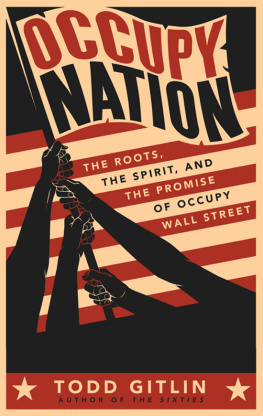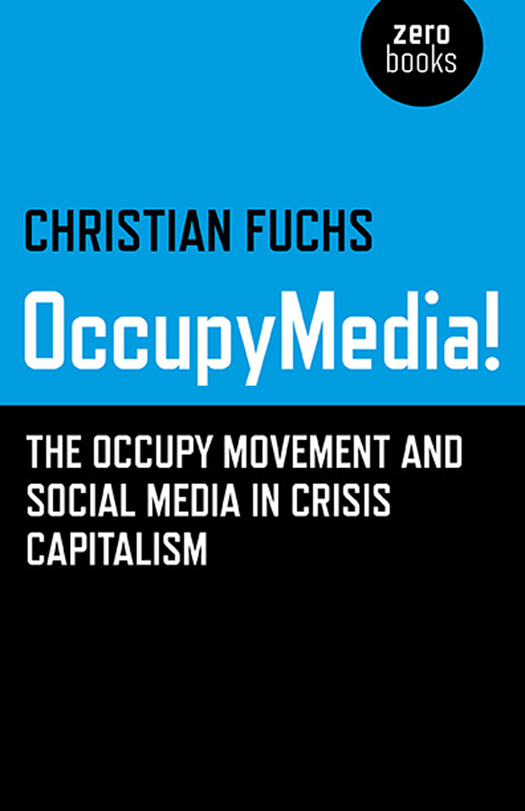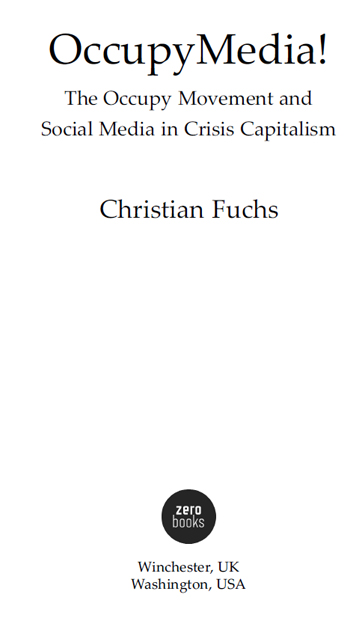First published by Zero Books, 2014
Zero Books is an imprint of John Hunt Publishing Ltd., Laurel House, Station Approach,
Alresford, Hants, SO24 9JH, UK
www.johnhuntpublishing.com
www.zero-books.net
For distributor details and how to order please visit the Ordering section on our website.
Text copyright: Christian Fuchs 2013
ISBN: 978 1 78279 406 6
All rights reserved. Except for brief quotations in critical articles or reviews, no part of this book may be reproduced in any manner without prior written permission from the publishers.
The rights of Christian Fuchs as author have been asserted in accordance with the Copyright, Designs and Patents Act 1988.
A CIP catalogue record for this book is available from the British Library.
Design: Stuart Davies
Printed and bound by CPI Group (UK) Ltd, Croydon, CR0 4YY
We operate a distinctive and ethical publishing philosophy in all areas of our business, from our global network of authors to production and worldwide distribution.
Other key works by Christian Fuchs
Fuchs, Christian. 2014. Digital labour and Karl Marx. New York: Routledge.
Fuchs, Christian. 2014. Social media. A critical introduction. London: Sage.
Trottier, Daniel and Christian Fuchs, eds. 2014. Social media, politics and the state: Protests, revolutions, riots, crime and policing in the age of Facebook, Twitter and YouTube. New York: Routledge.
Fuchs, Christian and Marisol Sandoval, eds. 2013. Critique, social media and the information society. New York: Routledge.
Fuchs, Christian and Vincent Mosco, eds. 2012. Marx is back The importance of Marxist theory and research for Critical Communication Studies today. tripleC: Communication, Capitalism & Critique 10 (2): 127-632. http://www.triple-c.at/index.php/tripleC/issue/view/25
Fuchs, Christian, Kees Boersma, Anders Albrechtslund, Marisol Sandoval, eds. 2012. Internet and surveillance. The challenges of web 2.0 and social media. New York: Routledge. Routledge Studies in Science, Technology and Society Series.
Fuchs, Christian. 2011. Foundations of critical media and information studies. New York: Routledge.
Fuchs, Christian and Rainer E. Zimmermann. 2009. Practical civil virtues in cyberspace: towards the utopian identity of civitas and multitudo. Aachen: Shaker.
Fuchs, Christian. 2008. Internet and society: social theory in the information age. New York: Routledge.
Fuchs, Christian. 2005. Herbert Marcuse interkulturell gelesen (Herbert Marcuse read interculturally, in German). Interkulturelle Bibliothek Vol. 15. Nordhausen: Bautz.
Fuchs, Christian. 2005. Emanzipation! Technik und Politik bei Herbert Marcuse (Emancipaton!: Technology and Politics in the Works of Herbert Marcuse, in German). Aachen: Shaker.
The goal-determining activity of capital can only be that of growing wealthier, i.e. of magnification, of increasing itself. [] The labour which stands opposite capital is alien labour, and the capital which stands opposite labour is alien capital. The extremes which stand opposite one another are specifically different. [] Where they relate to one another [] negatively, as in the case of money, it becomes madness; madness, however, as a moment of economics and as a determinant of the practical life of peoples. [] the real not-capital is labour.
Karl Marx
This book is dedicated to the worldwide new working class of activists that struggles for justice and against capitalism.
Acknowledgement:
This work contains information from the OccupyMedia! Dataset that was collected and published as SPSS and CSV files, 2012/2013, available at: http://fuchs.uti.at/wp-content/OccupyMedia!_Dataset.sav and http://fuchs.uti.at/wp-content/OccupyMedia!_Dataset.csv under the Open Database License (ODbL) v1.0 http://opendatacommons.org/licenses/odbl/1.0/
The OccupyMedia! Surveys full questionnaire can be found at: http://fuchs.uti.at/wp-content/questionnaire.pdf
Rules and guidelines for the usage of the dataset: http://fuchs.uti.at/wp-content/DataUsageGuide.pdf
Description of the dataset: http://fuchs.uti.at/wp-content/mapping_questions_variables.pdf
Thanks! I thank Susann Krieglsteiner and Taghrid Baba who helped me organizing the OccupyMedia! Surveys data collection.
Contact Contact http://fuchs.uti.at @fuchschristian christian.fuchs@uti.at
1. Introduction: The Crisis of Capitalism
Voices of Occupy activists:
On capitalism: For me, the Occupy movement is one important part of the catalyst which will bring change to this corporate/political bloodsucking system that is bleeding us all dry (#386).
On activism: My impression is that the growing population of young (20-30) people with very dissatisfying life situations (e.g. little work / debt), the increasingly disturbing political / social climate, and social media combined to create this new form of action (#375).
On social media activism: Not everyone can go to the camps but the rest of us can help spread the word through social media (#333). Social media is then a good starting place for activism, but it can not end there, real action loud and in the streets is what works best! (#259). What awakened me. When I heard the 99% slogan, it all began to make sense. I had never been an activist before I heard about Occupy on Facebook. Now I am involved in Occupy every day, and have joined local peace groups and churches with their outreach programs for the poor. I am no longer alone or feel helpless. I am changing my world (#275).
On social media surveillance: Activists learned the hard way about how closely monitored social media is by law enforcement on a local, state, and federal level. Occupy Austin was infiltrated by law enforcement agencies, resulting in serious legal problems for several participants (#265).
On alternative social media: I would love to see activists using Diaspora and The Global Square, as they offer real advantages in terms of user privacy. However until there is a critical mass of users, these forms of communications are redundant in organising mass protest, and only serve as a way of limited communication between organisers (#238). Yes, the majority of the people dont know of the existence of the alternative platforms or simply dont use them. It is necessary to use the commercial platforms to reach a maximum of society. There can be a difference in the sort of information sharing on the platforms, while the commercial ones are basically good for sharing the knowledge, showing people what goes around and sharing basic information for meet-ups, the alternative platforms that are more secure can be used for more specific or detailed information, strategy, group-building, creating a knowledge-database (#127).
This book presents the results of a study of the Occupy movements use of social media. It tells a story of social media activism, social media censorship and surveillance, corporate domination of social media and alternative social media in the context of the political economy of capitalism. The global crisis of capitalism forms the societal background of the Occupy movement and its media use. The causes of the crisis are explained in the introduction.
Section 2 gives an overview of the rise of social movements in contemporary crisis capitalism. Section 3 presents a classification of Occupys use of digital media. Section 4 explains the methodological foundations of the OccupyMedia! Survey. Section 5 presents the surveys basic results that are interpreted in section 6. Section 7 draws conclusions about media activism in an antagonistic world.







